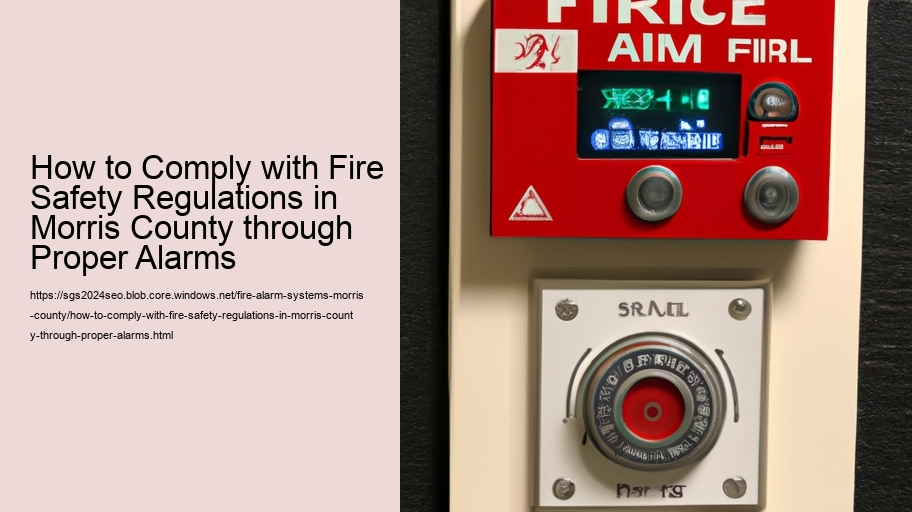Title: How to Comply with Fire Safety Regulations in Morris County through Proper Alarms
How to Choose the Best Fire Alarm Systems in Morris County .
Introduction
Fire safety is a critical concern for any community, and Morris County is no exception. With a growing population and diverse infrastructure, ensuring the safety of residents and properties is paramount. Compliance with fire safety regulations not only protects lives but also preserves the economic stability of the community. One of the most effective ways to comply with these regulations is through the installation and maintenance of proper fire alarms. This essay explores the steps and considerations necessary to adhere to fire safety regulations in Morris County, emphasizing the role of proper alarms in safeguarding lives and properties.
Understanding Fire Safety Regulations in Morris County
Before delving into the specifics of fire alarms, it is crucial to understand the broader context of fire safety regulations in Morris County. The county follows the New Jersey Uniform Fire Code, which sets forth comprehensive guidelines for fire prevention, protection, and safety measures. These regulations are designed to mitigate fire risks and ensure prompt response in case of an emergency. Property owners, managers, and residents must familiarize themselves with the specific requirements applicable to their buildings, as compliance is not only a legal obligation but also a moral one.
The Role of Fire Alarms in Fire Safety
Fire alarms are a fundamental component of any fire safety strategy. They serve as the first line of defense by providing early warnings of potential fire hazards. Early detection is crucial, as it allows occupants to evacuate promptly and minimizes the risk of injury or death. In Morris County, the installation of fire alarms is not merely recommended but is often mandated by law, especially in commercial buildings, residential complexes, and public facilities.
Choosing the Right Fire Alarm System
Selecting the appropriate fire alarm system is a critical step in complying with fire safety regulations. There are various types of fire alarms available, each with its features and benefits. Key factors to consider include the size and layout of the building, the specific risks associated with its use, and the needs of its occupants.
Smoke Alarms: Suitable for residential properties, these alarms detect smoke particles in the air, providing early warning of a potential fire. They should be installed in every bedroom, outside sleeping areas, and on every level of the home.
Heat Detectors: Ideal for environments where smoke alarms may cause false alarms, such as kitchens or garages, heat detectors respond to changes in temperature, signaling the presence of a fire.
Carbon Monoxide Detectors: While not directly related to fire, these detectors are essential in properties with fuel-burning appliances, as they detect the presence of carbon monoxide, a deadly gas often produced by incomplete combustion.
Integrated Systems: For larger commercial properties, an integrated fire alarm system that includes smoke detectors, heat sensors, and manual pull stations may be necessary. These systems often connect to a central monitoring station for immediate emergency response.
Installation and Maintenance
Proper installation and regular maintenance of fire alarms are crucial to their effectiveness. In Morris County, it is advisable to engage professionals for the installation process to ensure compliance with the New Jersey Uniform Fire Code. Professional installers have the expertise to position alarms effectively and integrate them with other safety systems.
Once installed, regular maintenance checks are essential. Batteries should be replaced annually, and the entire system should undergo professional inspection according to the manufacturer's recommendations and local regulations. This proactive approach ensures that the alarms function correctly and provides peace of mind to occupants.
Conclusion
Complying with fire safety regulations in Morris County requires a comprehensive understanding of the local codes and a commitment to implementing effective safety measures. Proper fire alarms are a cornerstone of this compliance, providing early warnings and enhancing the safety of residents and property. By selecting the right alarm system, ensuring professional installation, and committing to regular maintenance, property owners and managers can significantly reduce the risk of fire-related incidents. Ultimately, these efforts contribute to a safer, more resilient community where the protection of life and property is a shared responsibility.
